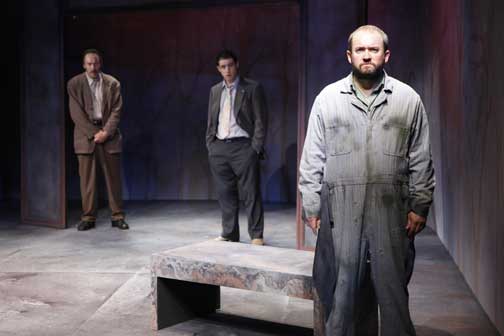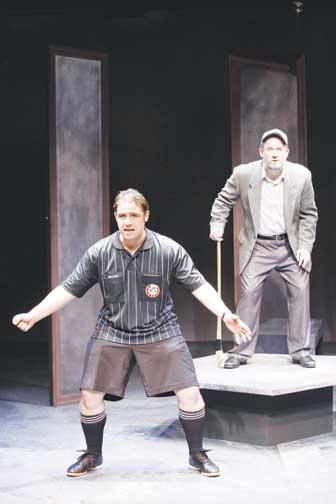


SERVICES
Tuesday August 5, 2009
A Double Bill At The Irish Rep
Gary Gregg (right foreground), Colin Lane, and Michael Mellamphy (left to right in background) (Carol Rosegg) Catherine Wylie Reviews 'After Luke' And "When I Was God''After Luke' and 'When I was God' opened in the Irish Repertory Theatre on July 29th and are running until September 20th. Written by Conal Creedon from Cork city, the plays are set in present day Cork and explore, primarily the relationship between father and son, but also the conflicting aspirations and ideas of family members. Starring Gary Gregg, Colin Lane and Michael Mellamphy who all exhibit their superbly versatile acting skills, both plays require them to perform the roles of more than one character. 'After Luke' explores the problems faced by a single father who has to raise two very different sons. We later learn in the play that the oldest son, who is simply named 'Son' (played by Gary Gregg), is not the biological child of Dadda (played by Colin Lane). The play moves between flashbacks of the sons from when they were young to the present day. The audience learns that from a young age the pair didn't get on, and both sons believe that they are the one who the father likes least, apparent in the asides from both characters. Woes of being the youngest and woes of being the oldest are felt, and it is hard to decide who actually comes out of the situation worse. Indeed, it is arguably their father who reveals to the audience that he loves both sons, but in different ways. Son resents the fact that his father always tells him that he's the oldest and he should have more sense, whereas Maneen (the youngest son played by Michael Mellamphy) feels as though his father and his older brother have a stronger bond. Once grown up, Maneen goes off to the bright lights of London for the "Soho sluts" amongst other attractions, whereas Son stays at home working as a mechanic and looking after his beloved chickens. Tuesday evening is Son's favorite time of the week as he drives his father to bingo, gets his messages in the local shop and talks to Martina Foley, the woman he would like to eventually marry. Meanwhile, Maneen is in London and is living a very monotonous life, working during the week, spending his wage at the weekend on drink, and not enjoying the benefits of the Soho sluts who he says have no interest in him. As the play progresses, the allegiance of the audience shifts to the plight of Son, who is portrayed as somewhat of a simpleton. This is in comparison to the shrewd Maneen, who on returning to Ireland, takes Martina Foley on a date and kills one of Son's chickens as a present to Mrs Foley. The buildup to the point at which the audience discovers the reason for the absence of their mother, is both cleverly written and brilliantly acted on stage. The fight between the father and the sons which follows this, is perhaps one of the most tense pieces of drama you will ever see. The style of the play, whereby Michael Mellamphy is required to make the transition from playing Maneen to Mrs Foley, is very commendable in both the directing and the acting. This style, which can be seen in the plays of Marie Jones and Owen McCafferty, is a difficult one to pull off, but it is certainly a success in this production. Mellamphy portrays the role of Mrs Foley to a tee and manages to extract a few chuckles from the audience at the same time. In fact, the three characters are extremely well cast, and it is impossible not to dislike the smarmy Maneen or feel sorry for loveable Son.
Michael Mellamphy (left) and Gary Gregg (right) in 'When I was God' playing at The Irish Rep (Carol Rosegg) The music in between scenes was very well chosen and added a hint of excitement to the minimalist set. Great use was made of the one piece of scenery centre stage, a table which Son lay under whilst in mechanic mode. However, one criticism would be that, although we are told it is set in the present day, it is not entirely convincing that it is. In fact, had the audience been asked afterwards what decade they believed the play was set, chances are that they would have guessed 1960s. I don't think it is believable that a young man and woman would go on a date to see Daniel O'Donnell in 2009. The only element of the present day apparent in the play is the continuous reference to the property boom. Despite that, 'After Luke' is an engaging and interesting depiction of family life, which is at times funny and at times heartbreaking. 'When I was God' stars Gregg and Mellamphy again in a play which is similar to the first but this time the conflict is between father and son, and husband and wife. The father (played by Gregg) wants Young Dinny (played by Mellamphy) to become a star hurling player, whereas little Dinny would prefer to become a soccer star. This horrifies the father as he regards soccer as a foreign sport played by those who caused 800 years of oppression in Ireland. Again, I would question the authenticity of this particular viewpoint as it's debatable just how realistic that is in the present day. However, despite that, this is an incredibly humorous play which offers up a light hearted portrayal of marriage, loaded with more humor due to Mellamhpy's fantastic second female portrayal of the day. This is a very lively play, which when staged in the small theatre, makes for much enjoyment. Not quite as thought provoking as the first, this play explores the aspirations that parents have for their children, and is done so in a creative manner. Gregg's portrayal of the sports commentator deserves special mention as he triumphs in it and could easily be mistaken for a veteran RTE broadcaster. Playing the father was a world away from playing Son, and so this is evidence of Gregg's superb talent as an actor. Both plays are very poetic in that they include a lot of repetition, which at times feels tiresome and unnecessary for two short pieces of drama, but for the most part adds poignancy and meaning. They explore aspects of Irish life that are apparent in plays by the likes of Friel, but they are done in a more modern way with a different style. With such commendable acting, these plays are certainly worth seeing at some time during their run at the Rep. |
CURRENT ISSUE

RECENT ISSUES


SYNDICATE
[What is this?]
POWERED BY

HOSTED BY

Terms of Service | Privacy Policy
Website Design By C3I







